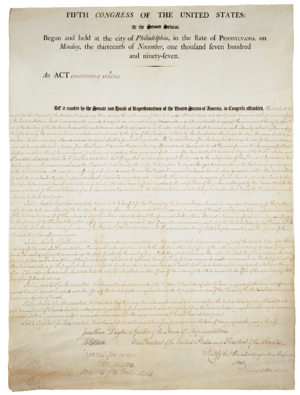Alien and Sedition Acts facts for kids
The Alien and Sedition Acts were a group of four laws passed in the United States in 1798. These laws made it harder for immigrants to become citizens and limited what people could say about the government.
The Naturalization Act of 1798 made it take much longer to become a U.S. citizen. The Alien Friends Act of 1798 let the president send non-citizens out of the country if they were thought to be dangerous. The Alien Enemies Act of 1798 gave the president more power over non-citizens during wartime. Finally, the Sedition Act of 1798 made it illegal to print or say false or harmful things about the government.
These laws were passed by the Federalist Party, which was in control of Congress at the time. They were mostly aimed at the Democratic-Republicans, the other main political party. Many new citizens supported the Democratic-Republicans. Only journalists who supported the Democratic-Republicans were charged under these laws.
The trials under the Sedition Act caused a lot of public anger. This anger helped the Federalists lose power in the election of 1800.
Supporters of the Acts, the Federalists, said these laws were needed for national security. This was during the Quasi-War, an undeclared naval war with France from 1798 to 1800. However, the Democratic-Republicans strongly disagreed. They said the laws stopped people from voting freely and violated free speech under the First Amendment.
While the laws were active, the Sedition Act was used to silence critics of President John Adams and his government. Many publishers who supported the Democratic-Republicans were arrested. The public's strong negative reaction to these laws helped the Democratic-Republicans win the election in 1800. After that, all but the Alien Enemies Act were removed. The Alien Enemies Act has been used several times since, especially during World War II. Most historians today view the Alien and Sedition Acts negatively. The U.S. Supreme Court has suggested that parts of these laws would not be allowed today.
Former President Donald Trump mentioned these acts during a campaign event in 2024. He said he would use them to remove non-citizens if he won the presidency.
Contents
The Acts
Alien Friends Act
 |
|
| Long title | An Act concerning Aliens |
|---|---|
| Enacted by | the 5th United States Congress |
| Legislative history | |
|
|
The Alien Friends Act let the president deport any non-citizen. This could happen if the president decided they were "dangerous to the peace and safety of the United States." If a non-citizen was thought to be dangerous, the president could tell them to leave the country. If they stayed, they could face up to three years in prison.
This law was not directly used to deport many people. But it was often used with the Sedition Act to stop people from criticizing President Adams. The Alien Friends Act was set to last for two years and then it ended. Thomas Jefferson called it "a most detestable thing."
Even though it wasn't directly used, many foreigners left the country because they feared this law. President Adams and his Secretary of State, Timothy Pickering, encouraged these departures. They thought the law was not strong enough.
Many French people were considered for deportation. But they were allowed to leave on their own, or Adams chose not to act against them. Some famous people included the writer Constantin François de Chassebœuf, comte de Volney and the scientist Joseph Priestley.
Alien Enemies Act
 |
|
| Long title | An Act respecting Alien Enemies |
|---|---|
| Enacted by | the 5th United States Congress |
| Legislative history | |
|
|
The Alien Enemies Act was passed to add to the Alien Friends Act. It gave the government more power over non-citizens during wartime. Under this law, the president could arrest, move, or deport any male over 14 from an enemy country. This law also gave some legal protections to those affected. Unlike the other acts, the Democratic-Republicans mostly agreed with this one.
The Alien Enemies Act did not expire like the other acts. It is still a part of U.S. law today. President James Madison used it against British citizens during the War of 1812. President Woodrow Wilson used it against people from enemy countries during World War I. In 1918, the law was changed to include females too.
On December 7, 1941, after the bombing of Pearl Harbor, President Franklin D. Roosevelt used this law. He ordered the arrest and removal of Japanese, German, and Italian non-citizens. Later, he used other powers to intern Japanese Americans.
In 1948, the Supreme Court looked at how long people could be held under this act. They said that people could be held even after fighting stopped, until a peace treaty was signed.
On September 20, 2024, former President Donald Trump said he would use the Alien Enemies Act if elected again. He said he would use it to quickly remove non-citizens and criminal groups.
Naturalization Act
The Naturalization Act made it much harder to become an American citizen. It changed the time needed to live in the U.S. from five years to 14 years. It also increased the notice time from three to five years. At this time, most immigrants supported Thomas Jefferson and the Democratic-Republicans. This law did not have an end date, but it was removed by a new law in 1802.
Sedition Act
The Sedition Act was passed by a close vote in Congress. It made it illegal to make false or harmful statements about the federal government. This law was used to stop people from criticizing President Adams. Many newspaper owners who supported Jefferson were arrested and found guilty.
The Sedition Act did not cover statements about the Vice President. This was because the Vice President at the time, Thomas Jefferson, was a political opponent of the Federalists. The Sedition Act ended in 1800. Many believe its passing helped Jefferson win the presidential election that year.
History of the Acts
The Alien and Sedition Acts were passed by the Federalist Party in 1798. Federalists became very suspicious of the Democratic-Republican Party. This was because the Democratic-Republicans supported France during the French Revolution. Some Federalists worried that a similar revolution might happen in the United States.
Newspapers from both sides made things worse. They accused leaders of being corrupt or even traitors. The unrest in Europe and calls for states to leave the U.S. seemed to threaten the new American republic. Federalists thought some of this trouble was caused by French immigrants or those who supported France.
The Acts were very controversial, especially the Sedition Act. It was debated hotly in Congress. Changes were made to allow people to argue that their statements were true. Still, it passed the House of Representatives by only three votes. It was also set to automatically end in March 1801.
People continued to protest the laws loudly. They became a major issue in the election of 1800. The opposition led to the Virginia and Kentucky Resolutions. These were secretly written by James Madison and Thomas Jefferson. When Thomas Jefferson became president, he pardoned those who were still in prison under the Sedition Act. Congress later paid back their fines.
Public Reaction
After the Alien and Sedition Acts were passed, protests happened across the country. Some of the biggest protests were in Kentucky. Crowds filled the streets and town square of Lexington. Critics said the laws were an attempt to silence voters who disagreed with the Federalist party. They also said the laws violated the right to free speech.
People also worried that the Alien and Sedition Acts gave too much power to the federal government. The Democratic-Republicans made the Acts a key issue in the 1800 presidential election. While the government prepared lists of non-citizens for deportation, many left the country on their own. President Adams never actually signed a deportation order.
The state legislatures of Virginia and Kentucky passed resolutions. These resolutions, secretly written by Jefferson and Madison, spoke out against the federal laws. Jefferson's first draft of the Kentucky Resolutions was very strong. It suggested that states could ignore the laws or even leave the country.
The Alien and Sedition Acts were never reviewed by the Supreme Court. The Court's power to review laws was not fully set until 1803. Later Supreme Court opinions, starting in the mid-20th century, have suggested that the Sedition Act would likely be found unconstitutional today. Most modern historians see the Alien and Sedition Acts as a mistake.
See also
 In Spanish: Leyes de Extranjería y Sedición para niños
In Spanish: Leyes de Extranjería y Sedición para niños
- Alien Act 1705 in Great Britain
- Seditious Meetings Act 1795 in Great Britain
- Espionage Act of 1917
- Logan Act of 1799
- Sedition Act of 1918
- Alien Registration Act of 1940
Images for kids
Category:United States federal legislation regarding foreign policy]]



